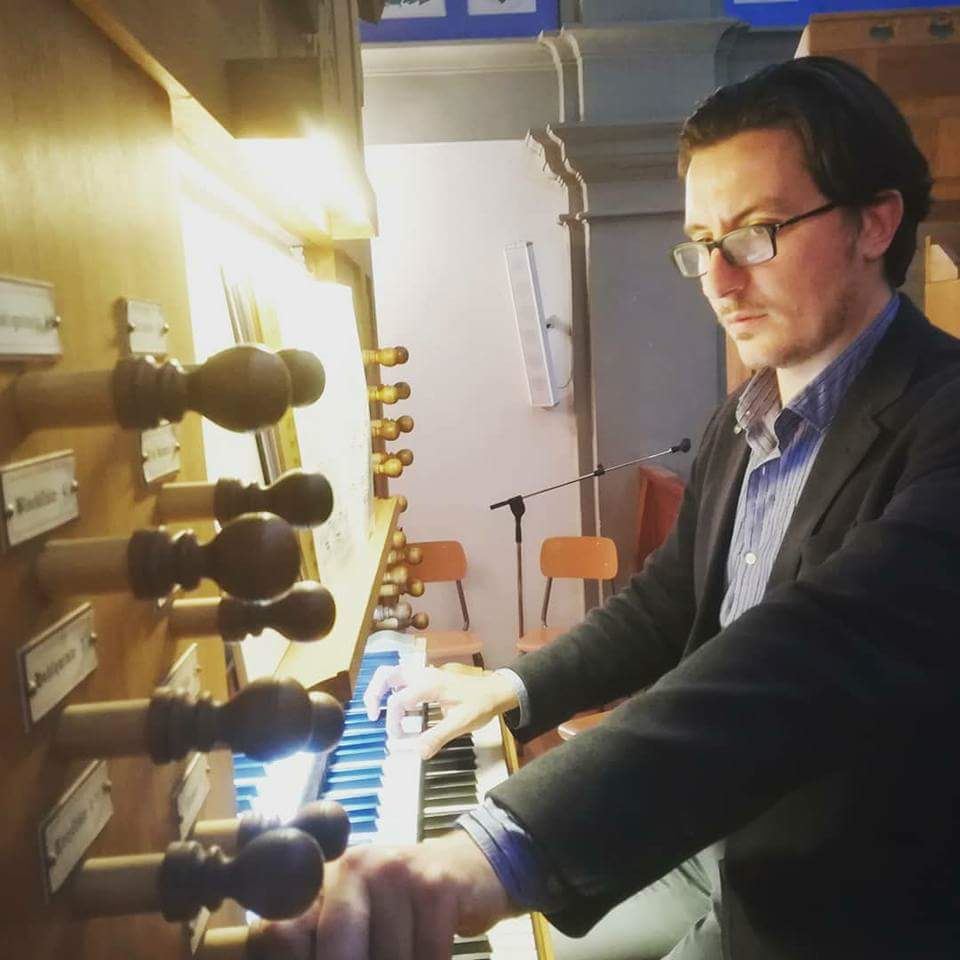The Italian Cultural Center of Minneapolis / St. Paul is pleased to welcome renowned Florentine pianist, organist, and harpsichordist Giacomo Benedetti to the beautiful St. Olaf Catholic Church in downtown Minneapolis.
This concert aims to highlight the organ as a musical instrument through a repertoire that runs from Germany, France, and Italy at the beginning of the 17th and 18th centuries to conclude with an Italian overture from the 1800s (more details below).
This one-time-only concert will take place March 3rd from 7:00 pm until 8:00 pm (reception from 6:30 to 7:00 pm). There will be a fifteen-minute Q&A to follow.
This will be a free event open to everyone with suggested donations of $10 for ICC Members and $15 for non-members.
We appreciate the help in arranging this event provided by Michael Barone. He illuminates the rich experience of pipe organs and their music through his weekly broadcasts of American Public Media’s PIPEDREAMS, aired locally Sunday mornings from 6:00 to 8:06 a.m. on the network stations of Classical Minnesota Public Radio (KSJN-99.5FM in the Twin Cities). The program also can be enjoyed online at any time anywhere, 24/7 globally, at www.pipedreams.org.
 Giacomo Benedetti is a renowned Florentine organist and pianist. In addition to releasing several CD’s and DVD’s, Giacomo is an active live entertainer, regularly performing as an organist, pianist, harpsichordist, and choir director. He has toured in Italy, Germany, Finland, Japan, Netherlands, Mexico, and the United States.
Giacomo Benedetti is a renowned Florentine organist and pianist. In addition to releasing several CD’s and DVD’s, Giacomo is an active live entertainer, regularly performing as an organist, pianist, harpsichordist, and choir director. He has toured in Italy, Germany, Finland, Japan, Netherlands, Mexico, and the United States.
Benedetti has studied piano with Rosa Scarlino, harpsichord with Annaberta Conti and Alfonso Fedi, basso continuo with Andrea Perugi, and organ and organ composition with Giovanni Clavorà Braulin at the conservatory “Lorenzo Cherubini” of Florence where he obtained his specialization degree cum laude. Benedetti has attended masterclasses in Italy and abroad, with well-known organists such as Gianluca Libertucci, Matteo Imbruno, Gustav Leonhardt, Celestino Dionsi, Cristophe Rousset, Ton Koopman, Liuwe Tamminga, Wolfang Zerer, Anton Pauw, and Michel Bouvard. He has worked in the Cathedral of Santa Maria del Fiore in Florence, the Church of Orsanmichele, St. Mark’s English Church, as well as San Marco’s Church in Santo Spirito. Currently he is an organist in San Miniato al Monte Basilica and Santa Felicita Church by Ponte Vecchio, Florence.
Performer’s notes on the program:
This concert aims to highlight the organ as a musical instrument through a repertoire that runs from Germany, France, and Italy at the beginning of the 17th and 18th centuries to conclude with an Italian overture from the 1800s.
In the 17th century, the most common musical forms were Canzone (singable melodies inserted into strict polyphony), Toccata (improvisational experiments that alternate with free polyphonic interludes), Preludes (a work of free improvisation full of dynamic swells and diminuendos).
Along with these forms, contemporary liturgical music welcomed a wave of choral and instrumental movements like offertories, chorales, and Our Fathers. The 18th century also saw the first instances of orchestral works, especially Sonatas, being adapted for solo organ or harpsichord.
- Christian Erbach (cir. 1568-1635): Canzon a 4 del IV Tono
- Vincenzo Pellegrini (1562-1630): Canzon detta la Berenice
- Georg Böhm (1661-1733): Vater unser im Himmelreich
- Georg Muffat (1653-1704): Toccata I, from Apparatus Musico-Organisticus
- Johann Sebastian Bach (1685-1750): Trio Super “Nun komm, der Heiden Heiland” BWV 660
- Dieterich Buxtehude (1637-1707): Prelude and Fugue in G minor BuxWV 163
- Giovanni Battista Martini (1706-1784): Adagio
- François Couperin (1668-1733): “Offertoire sur les Grands Jeux” from the “Messe à l’usage desse Paroisses”
- Domenico Scarlatti (1685-1757): Sonata in F minor 239 L. 281
- Giovanni Morandi (1777-1856): Overture from Sonata IX
A big Thank You to Global Minnesota for supporting
our events as part of their Year of Italy (2019-2020)